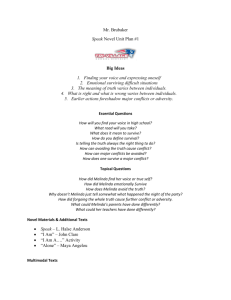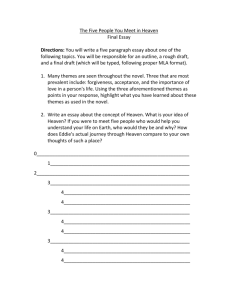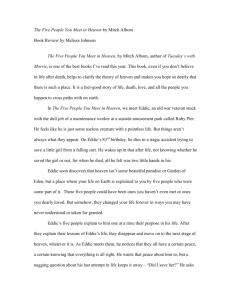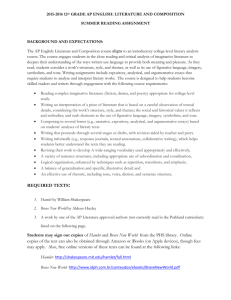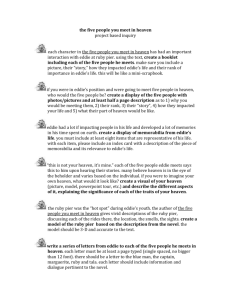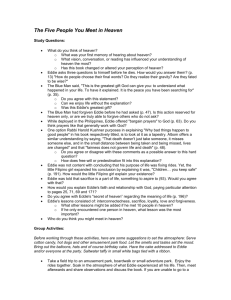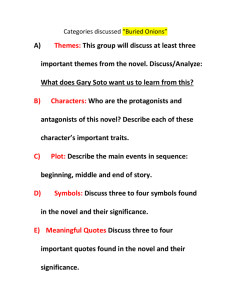Mr. Brubaker The Five People You Meet in Heaven Novel Unit Plan
advertisement
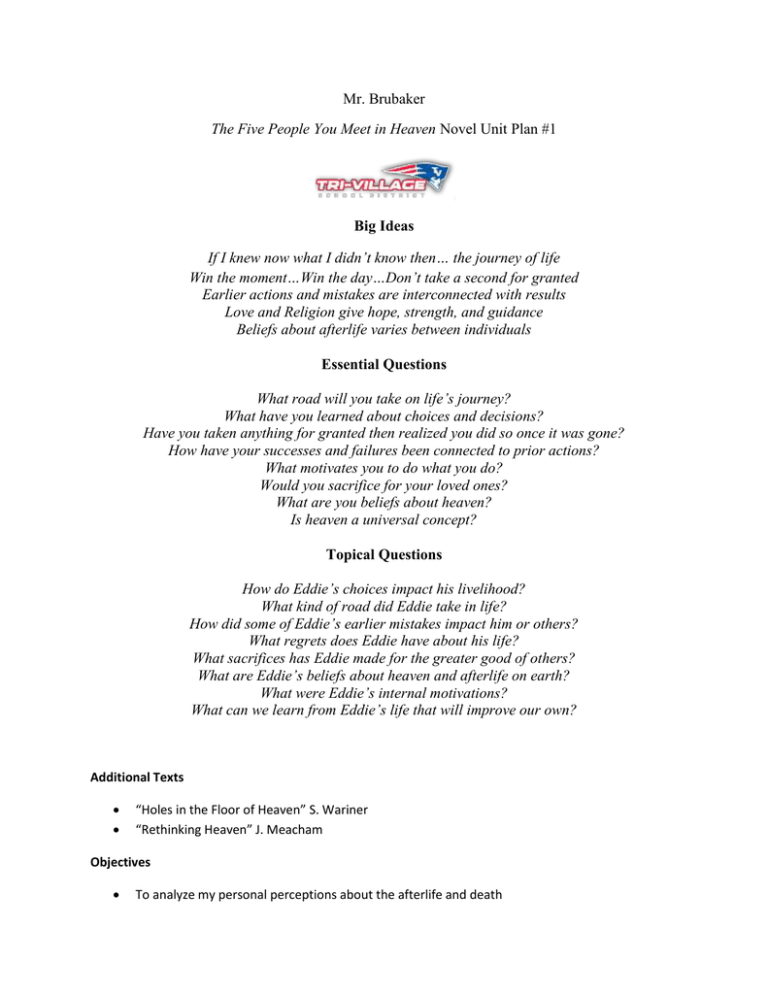
Mr. Brubaker The Five People You Meet in Heaven Novel Unit Plan #1 Big Ideas If I knew now what I didn’t know then… the journey of life Win the moment…Win the day…Don’t take a second for granted Earlier actions and mistakes are interconnected with results Love and Religion give hope, strength, and guidance Beliefs about afterlife varies between individuals Essential Questions What road will you take on life’s journey? What have you learned about choices and decisions? Have you taken anything for granted then realized you did so once it was gone? How have your successes and failures been connected to prior actions? What motivates you to do what you do? Would you sacrifice for your loved ones? What are you beliefs about heaven? Is heaven a universal concept? Topical Questions How do Eddie’s choices impact his livelihood? What kind of road did Eddie take in life? How did some of Eddie’s earlier mistakes impact him or others? What regrets does Eddie have about his life? What sacrifices has Eddie made for the greater good of others? What are Eddie’s beliefs about heaven and afterlife on earth? What were Eddie’s internal motivations? What can we learn from Eddie’s life that will improve our own? Additional Texts “Holes in the Floor of Heaven” S. Wariner “Rethinking Heaven” J. Meacham Objectives To analyze my personal perceptions about the afterlife and death To learn how different religions/cultures conceptualize the afterlife and death To use writing to analyze and critique the author’s purpose To analyze the novel’s structure, tone, plot, and themes To write reflections that balance personal experience with concepts from the novel Students will create a Power-Write paper in which they will evaluate the novel as a whole. Students will present analysis of the text within collaborative discussions. Students will comprehend and apply newly discovered vocabulary words from their workbook. Students will comprehend and identify figurative language use. Assessments Reading Checks Reflective Writings Unit Test 3-2-1 Research on other cultures concepts of death/afterlife Power-Write Discussions Power-Write Paper Argumentative Composition Views on the afterlife presentation Persuasive Writing Piece (Time Permitting) Writing Assignments Who will be waiting in heaven for you? Argumentative/Analysis Composition Extended Response Questions Power-Write Paper Double-Entry Journal with Quotes Multimodal Texts The Bucket List (2007) The Five People You Meet in Heaven (2004) Research World Religion – Views on the Afterlife Additional Learning Vocabulary Workbook Figurative Language (Continued throughout the year) Literary Element Analysis (Continued throughout the year) Literary Terms (Continued throughout the year) Argumentative or Analytical Composition Additional Assessments Vocabulary Workbook Vocabulary Chapter Test Vocabulary Unit Test Vocabulary Extended Response Idioms Worksheet Figurative Language Discovery Assignment Figurative Language Quiz Figurative Language Unit Test Argumentative or Analytical Composition Common Core State Standards Reading R.1. Cite strong and thorough textual evidence to support analysis of what the text says explicitly as well as inferences drawn from the text, including determining where the text leaves matters uncertain. R.2. Determine two or more themes or central ideas of a text and analyze their development over the course of the text, including how they interact and build on one another to produce a complex account; provide an objective summary of the text. RL.3. Analyze the impact of the author’s choices regarding how to develop and relate elements of a story or drama (e.g., where a story is set, how the action is ordered, how the characters are introduced and developed). R.4. Determine the meaning of words and phrases as they are used in the text, including figurative and connotative meanings; analyze the impact of specific word choices on meaning and tone, including words with multiple meanings or language that is particularly fresh, engaging, or beautiful. (Include Shakespeare as well as other authors.) RL.5. Analyze how an author’s choices concerning how to structure specific parts of a text (e.g., the choice of where to begin or end a story, the choice to provide a comedic or tragic resolution) contribute to its overall structure and meaning as well as its aesthetic impact. RI.5. Analyze and evaluate the effectiveness of the structure an author uses in his or her exposition or argument, including whether the structure makes points clear, convincing, and engaging. RL.6. Analyze a case in which grasping a point of view requires distinguishing what is directly stated in a text from what is really meant (e.g., satire, sarcasm, irony, or understatement). RI.6. Determine an author’s point of view or purpose in a text in which the rhetoric is particularly effective, analyzing how style and content contribute to the power, persuasiveness or beauty of the text. RI.7. Integrate and evaluate multiple sources of information presented in different media or formats (e.g., visually, quantitatively) as well as in words in order to address a question or solve a problem. R.10. By the end of grade 12, read and comprehend literature, including stories, dramas, and poems, at the high end of the grades 11-CCR text complexity band independently and proficiently. Writing W.1. Write arguments to support claims in an analysis of substantive topics or texts, using valid reasoning and relevant and sufficient evidence. W.2. Write informative/explanatory texts to examine and convey complex ideas, concepts, and information clearly and accurately through the effective selection, organization, and analysis of content. W.4. Produce clear and coherent writing in which the development, organization, and style are appropriate to task, purpose, and audience. (Grade-specific expectations for writing types are defined in standards 1–3 above.) W.5. Develop and strengthen writing as needed by planning, revising, editing, rewriting, or trying a new approach, focusing on addressing what is most significant for a specific purpose and audience W.6. Use technology, including the Internet, to produce, publish, and update individual or shared writing products, taking advantage of technology’s capacity to link to other information and to display information flexibly and dynamically. W.7. Conduct short as well as more sustained research projects to answer a question (including a self-generated question) or solve a problem; narrow or broaden the inquiry when appropriate; synthesize multiple sources on the subject, demonstrating understanding of the subject under investigation. W.9. Draw evidence from literary or informational texts to support analysis, reflection, and research. W.10. Write routinely over extended time frames (time for research, reflection, and revision) and shorter time frames (a single sitting or a day or two) for a range of tasks, purposes, and audiences. Speaking and Listening SL.1. Initiate and participate effectively in a range of collaborative discussions (one-on-one, in groups, and teacher-led) with diverse partners on grades 9–10 topics, texts, and issues, building on others’ ideas and expressing their own clearly and persuasively. SL.4. Present information, findings, and supporting evidence clearly, concisely, and logically such that listeners can follow the line of reasoning and the organization, development, substance, and style are appropriate to purpose, audience, and task. Language L.1. Demonstrate command of the conventions of standard English grammar and usage when writing or speaking. L.2. Demonstrate command of the conventions of standard English capitalization, punctuation, and spelling when writing. L.3. Apply knowledge of language to understand how language functions in different contexts, to make effective choices for meaning or style, and to comprehend more fully when reading or listening. L.6. Acquire and use accurately general academic and domain-specific words and phrases, sufficient for reading, writing, speaking, and listening at the college and career readiness level; demonstrate independence in gathering vocabulary knowledge when considering a word or phrase important to comprehension or expression

